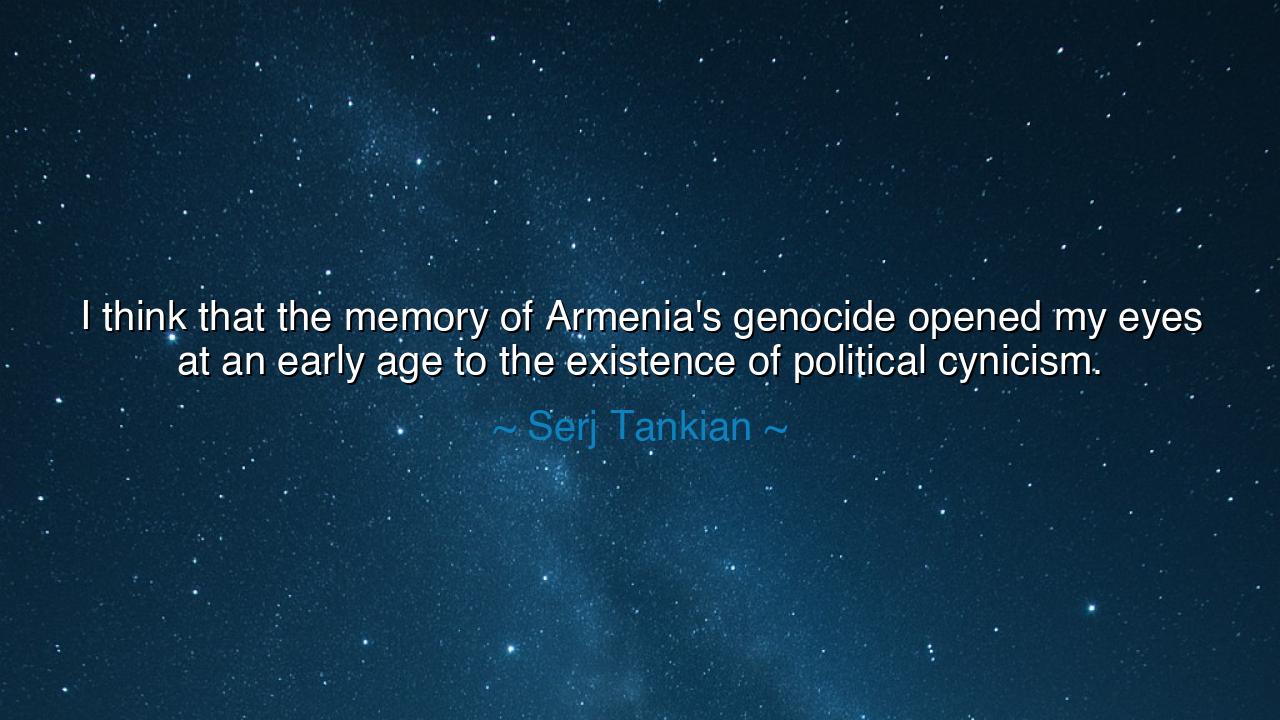
I think that the memory of Armenia's genocide opened my eyes at
I think that the memory of Armenia's genocide opened my eyes at an early age to the existence of political cynicism.






“I think that the memory of Armenia's genocide opened my eyes at an early age to the existence of political cynicism.”
Thus spoke Serj Tankian, the voice of rebellion and conscience, the poet who sang not for fame but for remembrance. His words are heavy with the sorrow of history and the awakening of truth. For he was born into a world that tried to bury memory beneath silence, where the cries of the dead were denied by the living. In remembering the Armenian Genocide, Tankian did not only inherit grief—he inherited clarity. He saw, even as a child, that the powers of the world often wear masks of justice while acting in cynicism and deceit. His eyes were opened not by joy, but by injustice; his soul sharpened not by privilege, but by pain.
To understand the meaning of his words, one must first know the wound that birthed them. In the early years of the twentieth century, during the final breaths of the Ottoman Empire, a horror unfolded—the Armenian Genocide, where over a million Armenians were slaughtered, exiled, or silenced. The world watched, some in sympathy, others in indifference, and still others in denial. Promises were made, then forgotten. Justice was called for, yet never delivered. Thus, Tankian, born decades later in a diaspora community, grew up amidst the whispers of survivors and the silence of nations. He learned early that political cynicism—the betrayal of truth for convenience—is not new, but ancient and enduring.
This awakening is both a burden and a gift. When one sees through the veil of false righteousness, one cannot return to blindness. Tankian’s art, his voice, and his fire all arise from that early vision. Through the memory of genocide, he came to understand that power without conscience is the most dangerous form of corruption. He saw how governments speak of freedom yet trade it for profit, how nations claim morality yet refuse to recognize their own crimes. Thus, his words are not only about the past—they are a mirror for every generation. To see injustice and still believe in goodness—that is the great trial of the awakened soul.
History, too, gives witness to this truth. Think of George Orwell, who saw the same political cynicism in his time—the twisting of language and truth by those who ruled. In his book 1984, he showed a world where lies became law and memory itself was rewritten. Like Tankian, Orwell knew that evil does not always come wearing horns; it comes in the voice of authority, speaking of order and progress while concealing its cruelty. Both men, separated by decades, speak to the same human blindness: the ease with which people accept injustice when it is convenient to do so.
But Tankian’s insight also carries a call to resistance. To see political cynicism is not to surrender to it; it is to fight it with truth, with remembrance, and with courage. He chose not silence but song. In his music with System of a Down, he turned pain into power, rage into melody, memory into defiance. Through his art, he shattered the walls of apathy, reminding the world that denial is the final stage of violence. In doing so, he fulfilled the duty of the living—to give voice to those who can no longer speak.
For cynicism thrives where memory dies. It feeds upon forgetfulness, upon the weariness of those who grow tired of caring. Tankian reminds us that to remember is to resist. Every time the story of Armenia is told, every time truth is spoken in the face of denial, the cynics of history are defeated. His childhood awakening to injustice became the foundation of a lifelong mission—to expose the hypocrisy of power and to keep the moral fire burning in an age that prefers shadows.
So, my children of the future, take this wisdom to heart: do not mistake awareness for bitterness. To see the world’s cruelty and still choose compassion is the highest form of strength. Do not close your eyes to injustice, for silence is complicity. Instead, let memory be your shield and truth your weapon. Speak, even when it costs you comfort; remember, even when the world commands you to forget. For as Serj Tankian teaches, the heart that awakens to cynicism must also awaken to its opposite—the fierce, unwavering hope that truth, though buried, will always rise again.
Practical teaching: Learn history not as a list of dates but as the soul of humanity—its wounds, its wisdom, its warnings. Question the rhetoric of those in power. Support those who speak truth, even when it shakes the world. And above all, remember—for remembrance is the beginning of justice, and justice is the end of cynicism.






AAdministratorAdministrator
Welcome, honored guests. Please leave a comment, we will respond soon